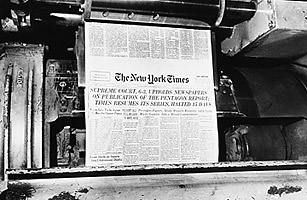
It was 40 years ago this month that a criminal conspiracy was hatched in the Oval Office — a fact that bears noting as we witness the self-immolation of Anthony Weiner over matters of far less import and ask ourselves just what determines which sins are punished, which forgiven and which forgotten in the public arena.
The occasion in 1971 was the publication of the first installment of the Pentagon Papers, a 2.5-million-word secret history of the Vietnam War. Richard Nixon was not so concerned about the actual secrets — they mainly crucified Lyndon Johnson — but he was horrified by the fact of such an epic leak, which would make conducting a clandestine foreign policy with China much trickier. On June?30, 1971, the Supreme Court upheld the New York Times’ right to publish the papers. Nixon sat in the Oval Office the next morning with his faithful lieutenant H.R. Haldeman, planning his counterattack. “I really need a son of a bitch,” Nixon said, “who will work his butt off and do it dishonorably.” Because it wasn’t as though this would be a fair fight. “Do you think, for Christ sakes, [that] the New York Times is worried about all the legal niceties? … We’re up against an enemy, a conspiracy. They’re using any means. We are going to use any means,” he said, stretching every word.
And thus was launched, a full year before the Watergate break-in, the war that would destroy a presidency. How do we know all this? The same way we came to study Weiner’s shiny torso and seamy texts: through technologies whose risks were not fully appreciated at the time. Nixon was not the first President to tape his conversations; it’s just that his system was voice-activated. We will never know if any other President approached Nixon in paranoia, profanity or potential criminality, since only his conversations were captured, subpoenaed and ultimately released on the front pages of newspapers.
Could he have survived Watergate if we had just read about his actions rather than heard them unfold in all their greasy glory? There’s no way to know, but when it comes to Weiner, we can hazard a guess. A new Pew poll found that most respondents thought the recent rash of sex scandals reflects not lower standards among lawmakers, just higher scrutiny. Had we not seen the crotch shots and read the sexts but merely heard that Weiner was communicating inappropriately with his fans, it’s hard to believe he would have been judged unfit for congressional service by his peers.
This is the lawmaking body that was content to censure Gerry Studds for inviting a 16-year-old page to his apartment, getting him drunk and seducing him. Barney Frank put a prostitute on his personal payroll who proceeded to run his business out of Frank’s Capitol Hill apartment; Frank was reprimanded for fixing his parking tickets. Senator Larry Craig considered resigning after he was arrested in a sex sting in an airport men’s room but thought better of it and served out his term. Last year Senator David Vitter was re-elected in a landslide despite having his name turn up in the phone records of the D.C. Madam.
And that’s just the sex. FBI agents found $90,000 in bribe money in Congressman William Jefferson’s freezer; he was defended by colleagues and re-elected by voters before being sentenced to 13 years in prison. Charlie Rangel was writing laws on our taxes as chair of the Ways and Means Committee while somehow neglecting to pay his own. He lost the chairmanship but keeps his seat, from which he now defends Weiner.